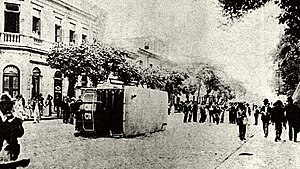
Back Vakcina Ribelo EO Revuelta de la vacuna Spanish Révolte du vaccin French Vaccinrevolte Dutch Revolta da Vacina Portuguese Вакцинное восстание Russian
| Vaccine Revolt | |
|---|---|
 Tram overturned by the population in Praça da República during an uprising | |
| Date | 10-16 November 1904 |
| Location | Rio de Janeiro, Brazil |
| Caused by | Mandatory vaccination law Popular dissatisfaction with public services |
| Resulted in | Revocation of mandatory vaccination Military coup attempt defeated |
| Casualties and losses | |
| 30 killed 110 wounded 945 arrested (461 deported to Acre) | |
The Vaccine Revolt (Portuguese: Revolta da Vacina) was a popular riot that took place between 10 and 16 November 1904 in the city of Rio de Janeiro, then the capital of Brazil. Its immediate pretext was a law that made vaccination against smallpox compulsory, but it is also associated with deeper causes, such as the urban reforms being carried out by mayor Pereira Passos and the sanitation campaigns led by physician Oswaldo Cruz.
At the beginning of the 20th century, the urban planning of the city of Rio de Janeiro, inherited from the colonial period and the Brazilian Empire, no longer matched its status as a capital and center of economic activities. In addition, the city suffered from serious public health problems. Diseases such as smallpox, bubonic plague and yellow fever ravaged the population and worried the authorities. In order to modernize the city and control such epidemics, president Rodrigues Alves initiated a series of urban and sanitary reforms that changed the city's geography and the daily life of its population. The architectural changes in the city were the responsibility of engineer Pereira Passos, appointed mayor of the then Federal District. Streets were widened, tenements were destroyed and the poor were removed from their former homes. Doctor Oswaldo Cruz, who took over the General Directorate of Public Health in 1903, was responsible for the sanitation campaign in the city, which aimed to eradicate epidemics. To this end, in June 1904, the government proposed a law that made vaccinatation mandatory. The law generated heated debates between legislators and the population, and, despite a strong opposition campaign, was approved on 31 October.
The trigger for the revolt was the publication of a bill to regulate the application of the mandatory vaccine in the newspaper A Notícia, on 9 November 1904. The bill would create a requirement of proof of vaccination for enrollment in schools, obtaining jobs, traveling, getting accommodations, and weddings. It also provided for the payment of fines for those who resisted vaccination. When the proposal leaked to the press, the indignant and upset people started a series of conflicts and demonstrations that lasted for about a week. Although mandatory vaccination triggered the revolt, protests soon began to target public services in general and government representatives, in particular against repressive forces.
A group of florianist and positivist soldiers, with the support of some civil sectors, tried to take advantage of popular discontent to carry out a coup d'état in the early hours of 14 to 15 November, which, however, was defeated. On 16 November, a state of emergency was decreed and mandatory vaccination was suspended. Given the systematic repression and extinguished the triggering cause, the movement ebbed. In the repression that ensued, police forces arrested a number of suspects and individuals considered to be troublemakers, regardless of whether they were involved in the revolt or not. The total balance was 945 people arrested on Ilha das Cobras, 30 dead, 110 injured and 461 deported to the remote state of Acre.